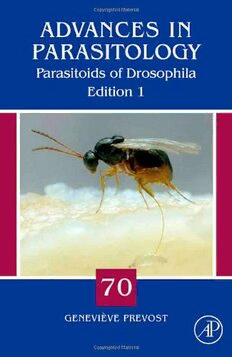
Advances in Parasitology PDF
387 Pages·2009·6.316 MB·English
Most books are stored in the elastic cloud where traffic is expensive. For this reason, we have a limit on daily download.
Preview Advances in Parasitology
Description:
Extensive studies have been conducted on various parasitoid species, and almost all different approaches of the biology of parasitoids have been, at least once, studied on parasitoids of Drosophila. Originally, this particular interest for species parasitizing Drosophila hosts has been motivated by the exceptional knowledge we have on Drosophila species themselves, and particularly on D. melanogaster. Benefiting from this knowledge, the research conducted on Drosophila parasitoids have covered very diversified topics, such as physiological and immunity relationships with hosts, reproduction strategies, the role of symbiotic micro-organisms, behavioural and chemical ecology, genetics, population dynamics, evolutionary biology, the different approaches of which including field surveys and laboratory experiments. As a result, we now benefit from a particularly vast and extended knowledge of the biology (and also biochemistry, molecular genetics, .) of these parasitoid species mainly belonging to Braconidae and Cynipidae Hymenoptera, and of their relationships with their Drosophila hosts. Extensive studies have been conducted on various parasitoid species, and almost all different approaches of the biology of parasitoids have been, at least once, studied on parasitoids of Drosophila. There is This book synthesizes the different fields of research that can be explored thanks to the "Drosophila parasitoid" model. It shows how the complementary knowledge arising from different approaches is inspiring the development of new areas of research on this biological model. It will also report techniques and methods specifically adapted to the study of larval parasitoid species.
See more
The list of books you might like
Most books are stored in the elastic cloud where traffic is expensive. For this reason, we have a limit on daily download.
